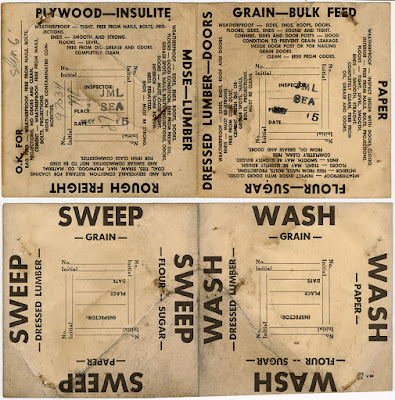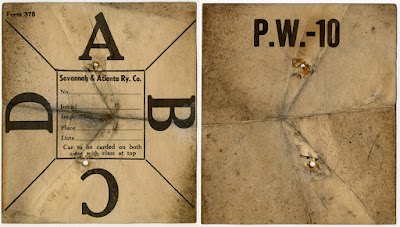In an evear-growing series of posts, I have been writing about both route cards, cards
that direct movement of freight cars, and grading cards, those that give
results of an inspection of a car interior for loading. This one
continues my topic of grading cards and systems. The previous post on
this part of the subject can be found here: https://modelingthesp.blogspot.com/2023/09/route-cards-part-25-still-more-grading.html . As before, all cards are from the collection of Michael Litant.
The first example I want to show is from the Chicago & Eastern Illinois, identifying a car that is suitable for grain loading. It’s 3 x 4.25 inches in size. Note that the form would permit an inspector to choose a class of loading (for example, A, B, C, etc.) but here the choice was a specific cargo, perhaps because lots of grain was being loaded. The car number, 64127, is clear, but the only initial shown is “C,” probably the usual practice of abbreviating the home road’s cars. If so, it was a 40-foot boxcar of 1937 AAR design.
A second example is another of those interesting multi-sided cards, this one hexagonal, from the Burlington. It’s 6 inches across the parallel sides. It’s dated June 18, 1968 at Cicero, Illinois, and the car given a grade 1 rating was Q 48056, a 50-foot, double-door box car of 70-ton capacity. Note that the second side has a lot of non-grading segments, such as clean out, quick clean, bad order, light weigh, and so on.
The other NP car is of the “extreme cargo detail” variety, and is
evidently meant to be folded to make the operative side uppermost. It’s 5
x 10 inches overall, but folded it would be 5 inches square. It appears
to be dated May 27, 1965 at Seattle, and the car was NP 97034, a 50-foot RBL (bunkerless) refrigerator car.
My fifth example is from the M-K-T, usually called the “Katy,” and is interesting because it seems to contemplate only one typical cargo for each grade, A and B. It’s 4 x 4 inches, and isn’t filled out.
As a final example, here is a card from a much smaller railroad, the Savannah & Atlanta, and is 4.5 x 5 inches in size. It isn’t filled out. The back just shows “P.W.-10,” the meaning of which I can’t supply.
This marvelous collection of route and grading cards, loaned to me by Michael Litant for scanning, is really a trove of information for me. I hope others have also found these cards informative as well as interesting.
Tony Thompson






No comments:
Post a Comment